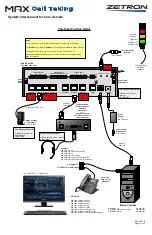
3
1.
S
S
A
A
F
F
E
E
T
T
Y
Y
I
I
N
N
S
S
T
T
R
R
U
U
C
C
T
T
I
I
O
O
N
N
The Alpha 600 series are relatively simple to use, however, it is very important to observe the proper
safety procedures before, during, and after operation. When used properly, the Alpha 600 series will
enhance safety, productivity and efficiency in the workplace.
The following procedures should be strictly followed:
1.
The transmitter is equipped with a specialized battery charger. Only two ”AA” Ni-MH rechargeable
batteries are allowed to be used in the transmitter. Please note the polarity of the batteries. Do not
use other types of battery to prevent any accident.
2.
Be sure to replace the batteries with the same brand and specification at the same time. Do not
replace only one battery in the battery compartment otherwise the charging (discharging) performance
may be affected by the battery with lower voltage.
3.
Do not place the battery charger under the raining, high temperature, humid and with corroded air
environment. Indoor with good ventilation is suggested. Please also do not use the battery
charger under 0
℃
.
4.
It is prohibited that the high power wireless equipment such as walkie-talkie, wireless network
transmitter, … etc. is closed to the transmitter or receiver as it might cause interference.
5.
Do not change the IDs on transmitter encoder and receiver decoder boards at will.
6.
Check the transmitter casing and pushbuttons daily. Should any damage that could inhibit the
proper operation of the transmitter be found the unit should be immediately removed from service.
7.
Check the transmitter voltage whenever it is operated. Place the transmitter into battery charger
when battery is running out or the voltage is low.
8.
The red emergency stop button (EMS) should be checked at the beginning of each shift to ensure it is
in proper working order and the “Stop” command is being received by the receiver.
9.
In the event of an emergency press down the EMS button will immediately deactivates the receiver
MAIN relay and the transmitter power. Then turned the power “off ” from the main power source to
the crane or equipment.
10.
Do not use the same RF channel and ID code as any other system in use at the same facility or within
300-meter distance.
11.
Ensure the waist belt is worn at all time during operation to avoid accidental damage to the
transmitter.
12.
Rotate the power switch to OFF position when the transmitter is not operated temporarily or the
operation is finished.
13.
Any repair or adjustment should be proceeding by repair technician for radio remote controls.
14.
The operator should not change any electrical parts at will.





































